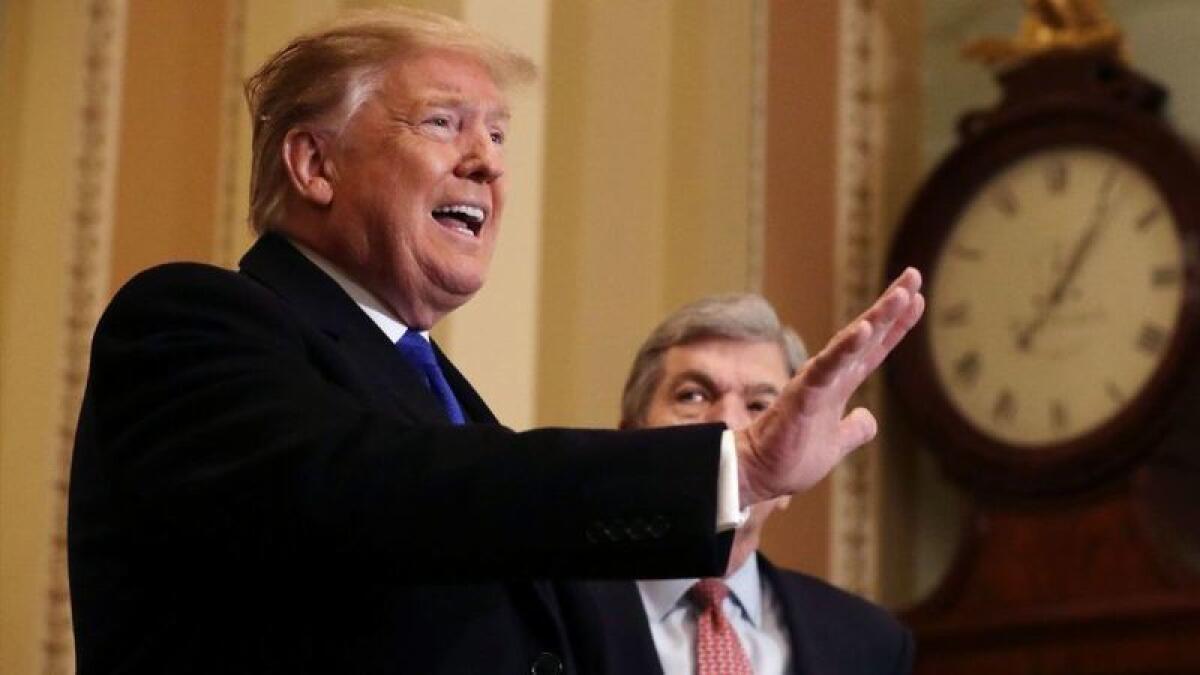Federal appeals court appears skeptical of Obamacare, putting future of law in doubt

Reporting from New Orleans — A panel of federal judges in New Orleans sharply questioned attorneys defending the Affordable Care Act on Tuesday, signaling that the U.S. 5th Circuit Court of Appeals may throw out at least part of the 2010 law.
That would set the stage for another showdown before the Supreme Court, which has twice in the last decade been called upon to rule on the landmark law, often called Obamacare.
Such a ruling could also prolong uncertainty over the fate of health coverage for tens of millions of Americans who depend on the law for health insurance and other protections, including the ban on insurers denying coverage to people with preexisting medical conditions.
The three judges on the appeals court panel in New Orleans asked few questions about how the latest legal challenge could affect Americans’ access to health insurance.
Instead, two of the judges – both appointed by Republican presidents – focused more on why the law should remain on the books after Congress in 2017 scrapped a tax penalty against people who didn’t have health insurance. That provision was once deemed essential to the law’s program for guaranteeing Americans insurance.
The penalty was also crucial to the healthcare law’s survival when it first came before the Supreme Court in 2012 in a lawsuit that alleged the insurance requirement was unconstitutional. At the time, Chief Justice John G. Roberts Jr. joined the court’s four liberal justices to uphold the law, but only after concluding that the requirement could stand because it was enforced with a tax penalty.
Now, in the current case, Texas and 17 other mostly Republican-led states argue that the requirement is no longer constitutional because the tax penalty has been eliminated and therefore, the whole law must be invalidated.
In December, a federal judge in Texas backed the plaintiffs’ argument, issuing a highly controversial ruling that the entire law is unconstitutional.
In New Orleans on Tuesday, Judge Jennifer Walker Elrod, who was appointed by President George W. Bush, and Judge Kurt Engelhardt, who was appointed by President Trump, repeatedly pressed California’s deputy solicitor general Samuel Siegel, who is defending the law, to explain why this was not true.
“If you no longer have the tax, why isn’t it unconstitutional?” Elrod asked.
Siegel and Douglas Letter, an attorney for the U.S. House of Representatives, which is also defending the law, argued that if the mandate is no longer constitutional, the judges should back a limited remedy, “severing” it from the rest of the law, while preserving the insurance protections and other provisions that Congress enacted in 2010.
Across the country, there is little evidence that eliminating the penalty has jeopardized the healthcare law’s broader program for expanding health coverage, as enrollment on insurance markets has remained stable. Millions of poor Americans are still getting coverage through an expansion of Medicaid, also made possible by the law, Medicaid enrollment data and national surveys indicate.
Even senior Trump administration officials, including White House economists and Justice Department lawyers, have noted in recent months the success of insurance markets and dismissed the impact of eliminating the penalty.
But Elrod and Engelhardt expressed reluctance to decide what parts should be saved or struck down, as California and other defenders of the law have urged.
“Congress can fix this,” Engelhardt said, suggesting that if the healthcare law needs to be revised, lawmakers on Capitol Hill should do it, not the courts.
Elrod also suggested that Congress had, perhaps, intended to repeal the whole law in the 2017 tax bill by scrapping only the mandate penalty. Congress in 2017 may have seen zeroing out the penalty as “a silver bullet,” she said.
Predicting how a court will rule based on a hearing is difficult. But Elrod and Engelhardt could form a majority on the three-judge panel. The third judge on the panel, Carolyn Dineen King, was appointed by President Carter. She did not speak at the hearing Tuesday.
If successful, the Texas lawsuit would strip coverage from as many as 20 million people and eliminate scores of other healthcare protections, including prescription drug assistance for seniors who rely on the Medicare Part D program and a popular rule allowing young people to remain on their parents’ health plans until they are 26.
That would assure that healthcare will once again be front and center on the campaign trail as Trump seeks reelection next year.
The hearing at the U.S. 5th Circuit Court of Appeals — which pits blue states defending the law against red states and the Trump administration seeking its repeal — has also raised the possibility that the healthcare law might survive in only parts of the country.
The Trump administration, which declined to defend the law and is now backing the legal challenge by Texas and the other Republican-led states, urged the appeals court to invalidate the healthcare law only in the 18 red states that are suing.
That could mean that insurance protections — including the ban on insurance companies denying coverage to people with preexisting medical conditions — could disappear in Texas, but remain in California.
Other provisions could be more difficult to roll back in some places, experts say. For example, the law established a new federal office to support experiments by physicians and hospitals to improve quality and lower healthcare costs. It is unclear if the federal Department of Health and Human Services would be forced to withdraw support for experiments in states where the law was repealed.
The appeals court judges appeared skeptical of this approach at Tuesday’s hearing.
But if implemented, such a ruling could widen the divide in the U.S. between states that have embraced the law and its extensive series of insurance protections and those that have been fighting it since President Obama signed the legislation in 2010.
Officials at the U.S. Department of Justice have declined to discuss the litigation.
But California Atty. Gen. Xavier Becerra said Tuesday that the state and its allies will continue to fight to save the law nationwide.
“Our state coalition made it clear: On top of risking lives, gutting the law would sow chaos in our entire healthcare system,” he said. “We will fight the Trump administration tooth and nail.”
More to Read
Get the L.A. Times Politics newsletter
Deeply reported insights into legislation, politics and policy from Sacramento, Washington and beyond. In your inbox three times per week.
You may occasionally receive promotional content from the Los Angeles Times.











